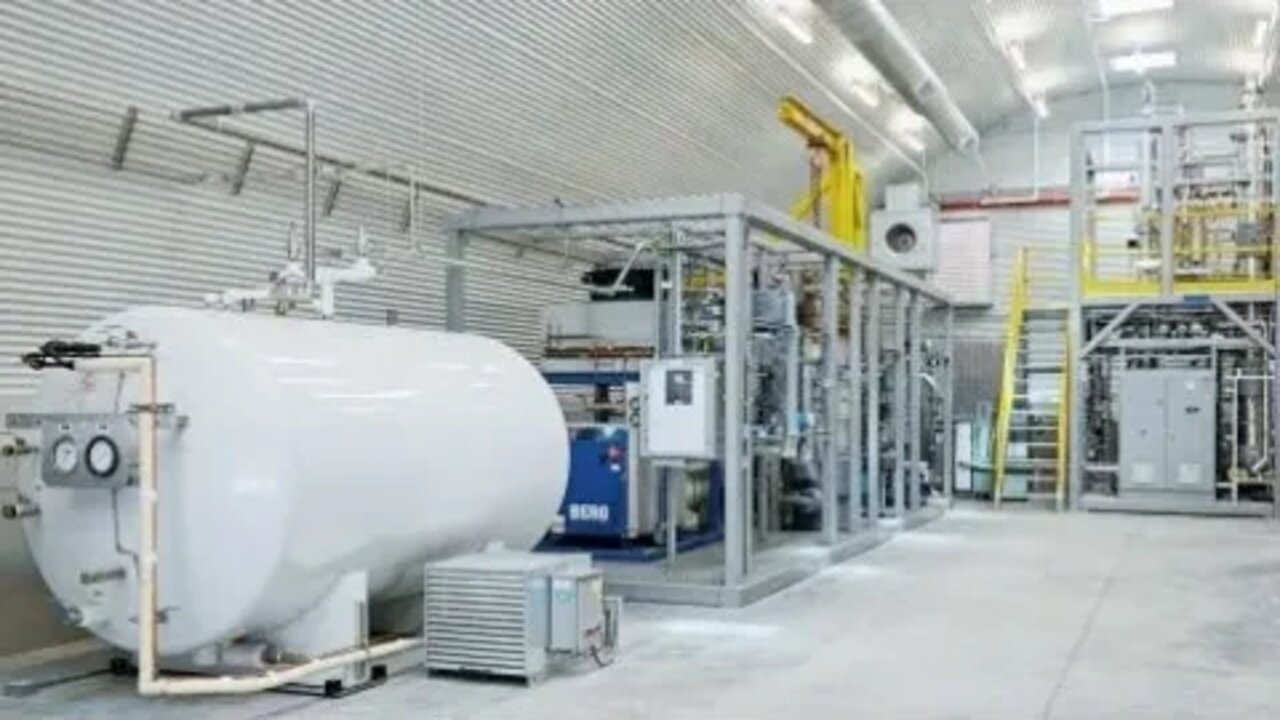Premium Only Content

This company wants to make air travel sustainable.
This company wants to make air travel sustainable.
In 2019, Air Company made a splash when it launched vodka derived from recaptured carbon, in an effort to reduce the amount of the harmful greenhouse gas in the atmosphere.
Today, the Brooklyn-based startup has begun using the same process to make fuel for airplanes.
Air Company’s sustainable aviation fuel, which was recently tested by the US Air Force, could ultimately help the airline industry hit its goal of net zero carbon emissions by 2050. Currently, the airline industry accounts for about 3% of total global carbon emissions each year, and mostly relies on traditional, fossil-based fuels that require various forms of environmental disruption to produce.
Already, some of the world’s biggest airlines are signing on to Air Company’s vision. The company announced last month that Jet Blue and Virgin Atlantic, as well as startup aircraft company Boom Supersonic, have agreed to purchase millions of gallons of its fuel in the coming years. Jet Blue Ventures, the airline’s investment arm, also invested directly in Air Company’s $30 million Series A funding round earlier this year.
How we think about what the company does is trying to solve humanity’s toughest problems,” Gregory Constantine, co-founder and CEO of Air Company, told CNN in an interview last month. “For us, climate change is the greatest challenge that we’re facing as humanity to date … so if we can work on technologies that take what was once really thought of as a problem and turn it into a solution, then that’s a massive win.”
A number of producers of sustainable aviation fuel have emerged in recent years, including a major Finnish producer called Neste, many of them using ingredients such as plant material and cooking oil. But Air Company’s production process starts by pulling harmful carbon emissions out of the air.
The company first harvests carbon, mostly from industrial settings such as biofuel production facilities. It then takes water, separates the hydrogen from the oxygen, and blends the captured carbon with the hydrogen and a proprietary mix of other compounds, according to Air Company CTO Stafford Sheehan. It then distills that solution down, using what looks like a larger version of, say, a whiskey distilling system. The final products are ethyl alcohol, which is used to make the company’s vodka and other products such as perfume, as well as paraffin, which forms the basis of its jet fuel.
In some ways, Sheehan said, the process mimics how plants work: It takes in carbon, and aside from the final products, the only other offput is oxygen. And the company says its tests have indicated that planes should be able to fly using its fuel without blending it with fossil-based fuels or modifying their engines.
By the time a plane has flown using Air Company’s fuel, it will have released the same amount of carbon dioxide back into the atmosphere as was captured to make the fuel, meaning the process on the whole is carbon-neutral, Sheehan said. The company uses renewable energy sources like solar to power its production facility.
Air Company does still have some work to do until its carbon-derived fuel is ready to be used widely on commercial flights. It needs more testing, and it needs to grow its manufacturing footprint. Sheehan said the company’s next production facility is already in the works and will be about 100 times the size of its Brooklyn test facility, which is probably about the size of a two-bedroom New York City apartment.
The company will also need to bring down the cost of its fuel, which is currently more expensive than traditional jet fuels, although the company declined to provide details on just how much. Air Company said that “consumers will not feel the impact of this shift,” and added that lowering the cost will be achieved in part “through an array of government incentives made available to fuel producers generating sustainable alternatives.”
Constantine said the company is planning for the first test of its fuel on a commercial plane next year, and expects to have its fuel used on its first commercial passenger flight by 2024.
Still, Air Company is hopeful that its efforts could eventually disrupt the aviation industry for the better, just as it’s been working to do with its consumer goods.
“Aviation has been a part of the goal since the start,” he said. “However, to get to those, you know, large industrial markets like aviation fuel, which it is traditionally known as the hottest industry industries to decarbonize, is going to take time. It’s going to take a lot of money and a lot of effort.”
That's all for now, remember to subscribe to our channel. Subscription is free.
Make sure you Subscribe,Like,Comment and Share.
-
 0:19
0:19
Thoughts TV
10 months agoBeautiful Nigerian lady dancing video
160 -
 49:01
49:01
BonginoReport
4 hours agoThe Final Countdown to Shutdown (Ep.109) - 12/20/2024
55.3K158 -
 LIVE
LIVE
Wendy Bell Radio
6 hours agoCongress Plays Shutdown Chicken
11,091 watching -
 1:55:07
1:55:07
Jeff Ahern
2 hours ago $0.85 earnedNews of the day with Jeff Ahern ( Here comes the holiday weekend!)
8.32K -
 1:18:33
1:18:33
Game On!
15 hours ago $8.77 earnedCollege Football Playoff Round 1 BEST BETS! | Indiana vs Notre Dame Preview
63.2K4 -
 42:08
42:08
PMG
10 hours ago $3.80 earned"Hannah Faulkner and James Staake | PAYPAL WITHHELD 100K FOR POLITICAL VIEWS?!"
24.8K3 -
 14:15
14:15
This Bahamian Gyal
21 hours agoDC server REFUSED to serve Donald TRUMP, then THIS happened . . .
44.4K32 -
 13:47
13:47
MichaelBisping
15 hours agoBISPING Reacts: "Tyson Fury will RETIRE and F&$K UP USYK?!" | Usyk vs Fury 2
27.5K7 -
 14:15
14:15
Tactical Advisor
16 hours agoNew Ruger Glock Clone | Magpul RXM (FIRST LOOK)
83.3K33 -
 7:55
7:55
The Nima Yamini Show
23 hours agoWho Is Controlling Facebook and Instagram? The Truth About George Soros and Meta’s Oversight Board
67.3K98